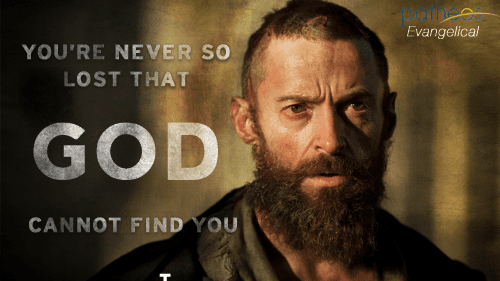I cannot think of any work of fiction that conveys the contrast between Law and Grace as vividly and profoundly as Les Miserables. As a long-time fan of the novel and the musicals, I went to see the movie recently and enjoyed it immensely. With minor variations, it’s a rendering of the musical, and the musical does an extraordinary job of capturing the major moral and theological themes of the novel. With a harrowing performance from Anne Hathaway and fantastic range and power from Hugh Jackman (I felt a bit bad for Russell Crowe, who is a fine Javert in pure acting terms but hardly a singer), and strong performances also from those playing Cosette (young and old), Eponine, Marius and the Thenardiers, this is a movie worth your time.
Leah Libresco gets to the theology of the work when she writes about Inspector Javert:
“Javert loves God, in his own way, because Divine Law is the source of order in the world. For Javert, the absense of mercy is the greatest mercy of all, because it allows Javert to perfectly understand the world around him. Grace is a miracle, a dirty word, a motion to suspend the rules.
“Mercy unmoors the moral stars Javert navigates by, and, as an agent of the Law, he needs some kind of unfailing light to steer by. The more precisely he understands the world, the less margin for error he needs to leave. But, if God can break the rule that, if Lucifer falls, he will be in flame, how can Javert trust that the promise to the righteous will be kept? Perhaps he lacks faith in God’s goodness, but I think he’s also afraid he’d have to give up a little faith in Javert.
After all, if the moral universe is as mechanical as Javert dreams, he can save himself through his own efforts. If the rules are fixed and known, then all he has to do is follow them. If there are no miracles and no mercy, then everything is within Javert’s understanding, and his mastery is only limited by his self-control. God sets the rules, and Javert gets to play a fair game.”
I think she has the Javert part right. What I love is the contrast between Javert and Valjean. Both are creatures of the gutter (Javert was born in a prison), but their paths from a common origin are strikingly different. With a serious SPOILER WARNING for those who have neither read the novel nor seen the musical, here are some of the key contrasts:
- JAVERT has risen to the heights of his current position through unyielding will and meticulous discipline, by virtue of his own efforts. VALJEAN rises even farther, but through the decisive intervention of a Bishop who shows him a thoroughly unmerited grace that changes Valjean forever. Valjean is, almost literally, born again, as he lets go of his former identity and begins a new identity and a new life.
- JAVERT insists that every person without exception should be judged and punished according to his or her deeds. He’s genuinely irritated with Valjean when Valjean refuses to punish him for what Javert perceives to be a misdeed. He would agree with Socrates in Plato’s Gorgias that it is better for a perpetrator to be caught and punished. VALJEAN extends to others the same grace that was given him. He shows an extravagant grace to Fantine, the woman who worked in his factory and fell into prostitution after she lost her job, and an even more remarkable grace to Javert himself, when he lets the inspector go free from the student rebels’ camp.
- For JAVERT, God is essentially Deistic and explicable, even mathematical. As Leah illustrates, the celestial mechanics of divine judgment are, in Javert’s philosophy, as brilliantly clear and timelessly predictable as the paths of the stars. For VALJEAN, God is personal. When he prays to God, God is not merely the source of moral order and truth but a source of passionate love and intimate solace.
- JAVERT is incapable of compassion. He is unmoved by Fantine’s protestations regarding her daughter’s need, unmoved by Valjean’s plea to let him care for Cosette before he apprehends him. He watches, not hateful but simply unmoved, when a man is pinned underneath a cart, before Valjean lifts the cart to save him. Legalism ultimately devolves into something like the Law of Karma: everyone always, in the end, gets what he deserves. VALJEAN understands that people are more than their actions. Divine grace and mercy is inexplicable apart from — indeed confers — the sacred value of each individual.
- Finally, JAVERT does not believe that people can change. Once a thief, always a thief. Even when all the evidence shows that Valjean is a transformed man, Javert cannot even contemplate it. In a world without grace and rebirth, everything must proceed organically from that which precedes it. There is nothing new, nothing truly transformative, no dying-to that leads to a new being. VALJEAN knows that there is re-creation, a Second Adam, because he has experienced it personally. Hugo’s portrait of Valjean’s conversion and reformation is one of the greatest in western literature. It’s the difference between “there is nothing new under the sun” and “all things are made new,” the difference between the Law of Sin and Death and the Grace of God in Christ.
Have you seen the flick? What did you think? Let me know in the comments.

















